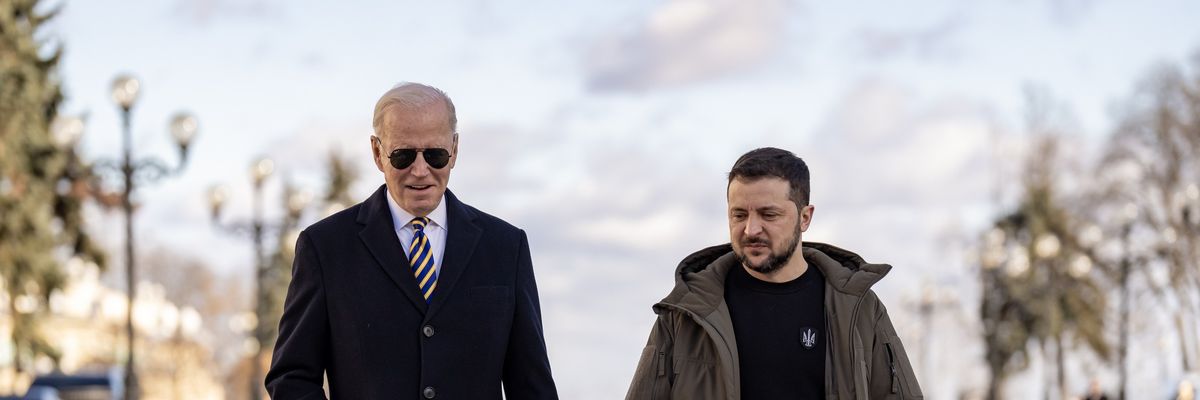Ukrainian President Volodymyr Zelensky came to the United States last month bearing a powerful moral message: Ukraine’s cause in fighting back against Russia is an unusually clear case of good versus evil.
Like Churchill rallying his people against Hitler’s forces in World War II, he urged continued American resolve in ensuring that the war ends in Ukrainian victory, and he warned that any compromise with Moscow will only invite more aggression. America, he argued, faces a stark choice between right and wrong.
If only things were that clear. In fact, the lengthening and increasingly bloody conflict in Ukraine is forcing the United States to grapple with a moral dilemma: a choice not between right and wrong, but between right and right.
It is right to help Ukraine defend itself against Russia’s invasion. After all, Ukraine did not attack Russia, and under the terms of the United Nations Charter, Russia had no legal basis for waging war on its neighbor absent authorization by the UN Security Council. And it is right to oppose Russia’s brutal conduct in the war, which includes strikes on civilian facilities and numerous instances of rape, murder, and abuse of individual Ukrainians, all violations of international law.
But these elements tell only part of the moral tale in Ukraine. German theorist Max Weber contrasted an “ethics of conviction” that battles against all injustice with an “ethics of responsibility” that calls for considering the potential results of such battles when weighing moral choices. An ethics of conviction argued that Western military intervention in Libya in 2011, intended to prevent mass atrocities by the barbarous Qadhafi regime, was the morally correct policy. An ethics of responsibility points out that America’s good intentions resulted in disastrous instability that continues to radiate into Africa, the Middle East, and Europe to this day.
These contrasting approaches complicate our calculations in Ukraine. Viewed through the lens of conviction, the correct response to Putin’s invasion seems clear: one does not indulge evil; one fights and defeats it. Viewed through the lens of results, the case for such an uncompromising approach is far less certain.
For now, the balance sheet in Ukraine features more assets than liabilities. Western aid has been instrumental in preventing Russian forces from capturing the vast bulk of Ukrainian territory and rendering Kyiv a Kremlin puppet, and the United States has so far managed to defend Ukraine while avoiding the escalatory dangers of a direct clash with the Russian military. But the conviction that any compromise with evil is wrong prompted Ukraine (with Western encouragement) to break off settlement talks that were progressing with Russia in April of last year, opting instead for a “counteroffensive” aimed at driving Russian forces off all Ukrainian territory, while so weakening Russia that it could never again contemplate such aggression.
That counteroffensive has gone poorly. If Ukraine continues attacking into the teeth of formidable Russian defenses, it risks depleting its increasingly scarce supplies of men and munitions to such an extent that it could become vulnerable to new Russian advances. Should Russia threaten to overrun Ukrainian forces, could the Biden administration refrain from some form of direct involvement in the war, if that seemed to be the only way to prevent a Russian victory? Having ruled out compromise with Putin, Biden’s political room for maneuver in such a scenario would be perilously narrow. Yet the consequences of a military clash between the world’s preeminent nuclear powers could be horrific for everyone.
Short of a Russian battlefield breakthrough, we must also consider the potential impact on Ukraine of a prolonged stalemate. Zelensky himself has also warned that a long war of attrition would mean “a fork in the road for Ukraine” and a “totally militarized economy.” Having already lost millions fleeing to Europe and Russia, Ukraine would lose even more people, both on the front lines and to emigration. A demographic study published last year indicated that by 2040, Ukraine’s working age population could fall by a third of its present size, with the number of children declining to half its pre-war level. A shrinking Ukraine would grow ever more dependent on the United States and Europe just to support its aging and war-crippled population’s needs for social services.
A prolonged war also threatens to reshape the world order in dangerous ways. The loss of cheap Russian energy supplies is damaging the German economy and fueling the rise of Germany’s leading far right party, Alternative for Deutschland. Western economic sanctions are also driving increased Russian trade and military cooperation with China, Iran, and North Korea, compounding America’s geostrategic challenges.
Is helping Ukraine recover Crimea and Russian-controlled portions of the Donbass worth a radicalized Germany, a threatening entente between Russia and China, an accelerated North Korean ICBM program, and robust Russian-Iranian military cooperation? These are not questions that those favoring an ethics of conviction in Ukraine want to answer. But they are questions that our elected representatives, as agents entrusted with safeguarding the interests of the American people, are duty-bound to consider.
It is right to help Ukraine defend itself against Russian aggression. And it is right to consider the potential fallout from the war on American and world security. Our challenge is to strike a pragmatic balance between these contending interests in justice and order. We will not achieve it through moral grandstanding, but through a judicious blending of military strength with diplomatic skill.
















